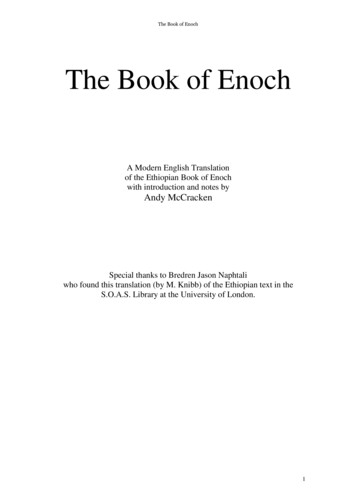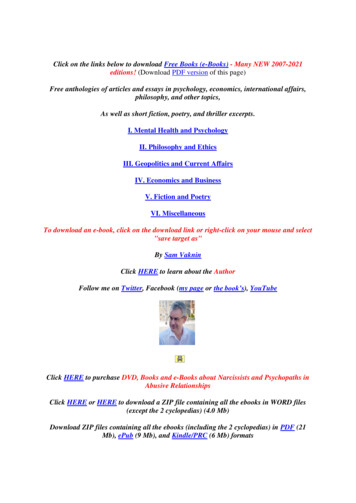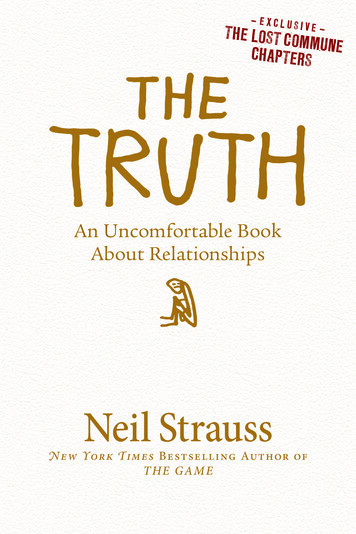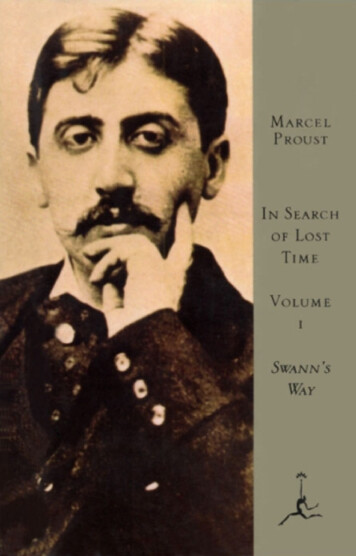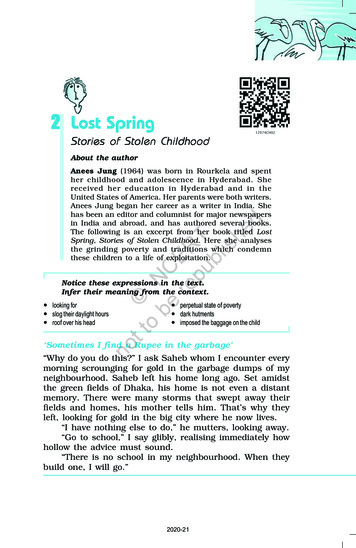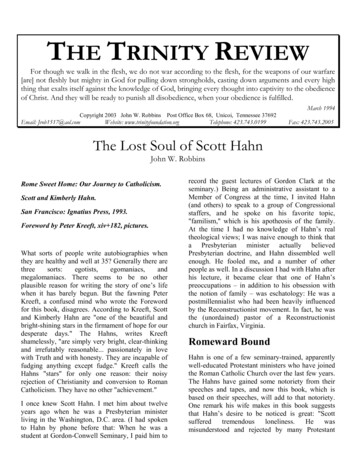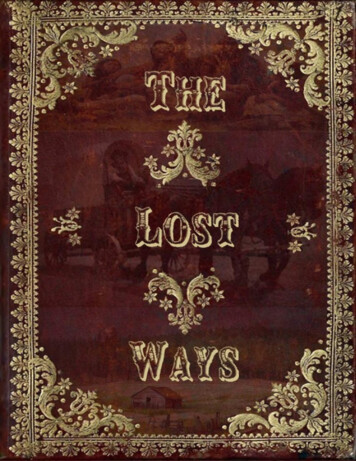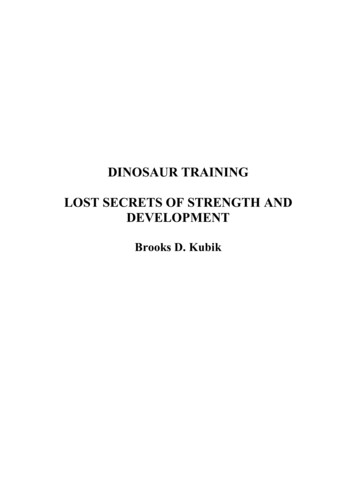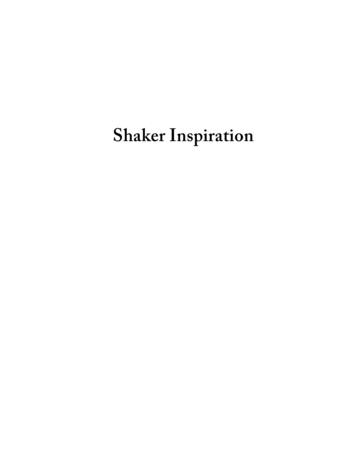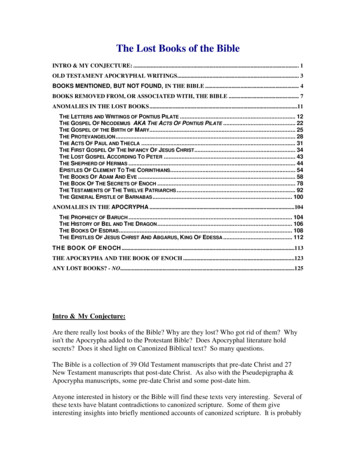
Transcription
The Lost Books of the BibleINTRO & MY CONJECTURE: . 1OLD TESTAMENT APOCRYPHAL WRITINGS. 3BOOKS MENTIONED, BUT NOT FOUND, IN THE BIBLE . 4BOOKS REMOVED FROM, OR ASSOCIATED WITH, THE BIBLE . 7ANOMALIES IN THE LOST BOOKS.11THE LETTERS AND WRITINGS OF PONTIUS PILATE . 12THE GOSPEL OF NICODEMUS AKA THE ACTS OF PONTIUS PILATE . 22THE GOSPEL OF THE BIRTH OF M ARY. 25THE PROTEVANGELION . 28THE ACTS OF PAUL AND THECLA . 31THE FIRST GOSPEL OF THE INFANCY OF JESUS CHRIST. 34THE LOST GOSPEL ACCORDING TO PETER . 43THE SHEPHERD OF HERMAS . 44EPISTLES OF CLEMENT TO THE CORINTHIANS. 54THE BOOKS OF ADAM AND EVE . 58THE BOOK OF THE SECRETS OF ENOCH . 78THE TESTAMENTS OF THE TWELVE PATRIARCHS . 92THE GENERAL EPISTLE OF BARNABAS . 100ANOMALIES IN THE APOCRYPHA .104THE PROPHECY OF BARUCH . 104THE HISTORY OF BEL AND THE DRAGON . 106THE BOOKS OF ESDRAS . 108THE EPISTLES OF JESUS CHRIST AND ABGARUS, KING OF EDESSA . 112THE BOOK OF ENOCH.113THE APOCRYPHA AND THE BOOK OF ENOCH .123ANY LOST BOOKS? - NO.125Intro & My Conjecture:Are there really lost books of the Bible? Why are they lost? Who got rid of them? Whyisn't the Apocrypha added to the Protestant Bible? Does Apocryphal literature holdsecrets? Does it shed light on Canonized Biblical text? So many questions.The Bible is a collection of 39 Old Testament manuscripts that pre-date Christ and 27New Testament manuscripts that post-date Christ. As also with the Pseudepigrapha &Apocrypha manuscripts, some pre-date Christ and some post-date him.Anyone interested in history or the Bible will find these texts very interesting. Several ofthese texts have blatant contradictions to canonized scripture. Some of them giveinteresting insights into briefly mentioned accounts of canonized scripture. It is probably
best to see Apocryphal literature as insightful but not "ordained." Just as I can personallywrite my views concerning scripture or what God has shown me through mycircumstances, my writings are not God's official words yet they are influenced by HisHoly Spirit in my life and my understanding of the Truth. I see it as similar to theApocryphal text. They can have important historical and theological bearing howeverthey must not be seen as God's official words because of the uncertainty and because ofsome contradictions in some of the texts.God is in control of His Holy Word, the Bible. He is also in control of history. At times,He reveals things to only a certain group of people. At times He reveals things to allpeople. However, the most important thing that He has not hidden from us is the thingthat we should be most concerned about: The Gospel of Jesus Christ. It is interesting toresearch about things relating to scripture and history, however, we should never lose ourfocus on why we even have "scripture".it is to point us to Jesus.An IntroductionThe following text is taken from: www.bibleufo.comWhen the origins of the Catholic Church began to emerge in the 4thCentury AD, it was under the guidance of the Emperor Constantine. Constantinebegan a centuries long effort to eliminate any book in the original Bible that wasconsidered unacceptable to the new doctrine of the church. At that time, it isbelieved there were approximately 600 books that compromised the work wenow know as the Bible. Through a series of decisions made by the early churchleadership, all but 79 of those books, known as the King James Version, werepurged from the work.For the faithful, who believe the Bible to be the inspired word of God, it isgenerally believed that King James received the entire Bible and simplytranslated it into the English language. Nothing could be further from thetruth. The books he undertook to translate had been chosen centuries earlier bychurch leaders as the only books acceptable to what they had determined was tobe the doctrine and practice of the church. In careful consideration of the factthat the church leaders have changed almost every doctrine and practice of thefirst church inspired by the Holy Spirit, it is doubtful this purging of hundreds ofbooks was done by the inspiration of God.We claim no expertise concerning the authenticity of any the lost booksand leave this judgment to the reader. We do, however, strongly reject the selfproclaimed authority of any dogmatically motivated and church-controlled mortalswho think themselves qualified to make such decisions. One of the most logicaland realistic concepts in the Bible is the caution that one should prove allthings. We believe that proving the veracity of a given thing is an individualresponsibility which must not, and should not, be the duty of those who thinkthey are better judges.
The Apocryphal, Or Deuterocanonical BooksThe 13 books known as the Apocrypha which were also in the original KingJames translation but were removed at the Synod of Dordrecht in 1619.Books Mentioned But Not FoundBesides the Apocryphal books eliminated from the Bible used by ProtestantChurch there are 23 other books mentioned in scripture, which do not appear inthe Bible.Books Removed From, Or Associated With, The BibleThe known books removed from the original Bible since the 4th century AD.Anomalies In The Apocryphal BooksThe anomalies connecting the Apocrypha to the Authorized King James Bibleand the advanced technology of the Elohiym.Anomalies In The Lost BooksThe Lost Books of the Bible contain the same aerial anomalies, beings andpeople flying up into the sky, and enigmatic events as the King James Bible.Anomalies In The Lost BooksThe anomalies found in the lost books by category.Old Testament Apocryphal WritingsThe term "apocrypha" comes from a Greek word meaning "hidden" or "secret" andthe books were originally considered by the early church as too exalted to be available tothe general public. As time progressed, the exalted nature of the books was lost and thebooks were deemed by some as false. Between the Book of Malachi and Matthew there isa gap of approximately 450 years. It is these books that fill that gap and in the time ofChrist, these books formed part of the Septuagint Greek Bible which was in circulation atthat time.What is missing from most Bibles, and our understanding of it, is what happened inthat 450 year gap. Prophets were still writing and reflecting on life in the Holy Land rightup until the Romans destroyed the temple of Jerusalem in 70 AD. The world that Jesusentered in 4 BC is not the world that Daniel and Malachi experienced. One of the valuesof these books is how they reflect the mindset of Judaism and a Roman world that theNew Testament writers faced. Malachi and Daniel leave us in Persia; Matthew brings usinto a Roman world. The Apocrypha bridges that gap and gently nudges us into thereality of Roman Palestine. It was only in the fourth century AD that Christians firststarted to question the “canonicity” of the works although most survived to be included inthe King James translation of the Bible in 1611.The Apocryphal, Or Deuterocanonical Books
The Prayer of Azariah, Song of Three Jews, (from Daniel)Bel and the Dragon (in Daniel) HEREThe Book of Baruch HEREFirst Book of Esdras HERE and HERESecond Book of Esdras, HEREThe Greek Additions to EstherHEREThe Epistle of Jeremiah HEREWisdom of Jesus' son Sirach, Ecclesiasticus HEREThe Book of Judith HEREFirst Book of Maccabees HERESecond Book of Maccabees HEREThird Book of Maccabees HEREFourth Book of Maccabees HEREThe Prayer of Manasseh HEREPsalm 151 HEREThe Wisdom of Solomon HEREThe Book of Susanna, (in Daniel) HEREThe Book of Tobit HEREHEREBooks Mentioned, But Not Found, In The BibleThere are between eighteen to twenty-four books mentioned in the Bible, but notincluded. The variation is due to possible double mentions using differing names for thesame book.Book of the CovenantExodus 24:7 And he took the book of the covenant, and read in the audience of thepeople: and they said, All that the Lord hath said will we do, and be obedient.There are those that believe the Book of the Covenant is found in Exodus chapters 20through 23. There are no authoritative sources for this text.Book of the Wars of the LordNumbers 21:14 Wherefore it is said in the book of the wars of the Lord, What he did inthe Red sea, and in the brooks of Arnon,Certain sources believe that this is to be found by drawing text from several OldTestament books. There are no authoritative sources for this text.Book of Jasher HereJoshua 10:13 And the sun stood still, and the moon stayed, until the people had avengedthemselves upon their enemies. Is not this written in the book of Jasher? So the sun stoodstill in the midst of heaven, and hasted not to go down about a whole day.2 Samuel 1:18 (Also he bade them teach the children of Judah the use of the bow: behold,it is written in the book of Jasher.)The Manner of the Kingdom / Book of Statutes
1 Samuel 10:25 Then Samuel told the people the manner of the kingdom, and wrote it ina book, and laid it up before the Lord. And Samuel sent all the people away, every man tohis house.Book of Samuel the Seer1 Chronicles 29:29 Now the acts of David the king, first and last, behold, they arewritten in the book of Samuel the seer, and in the book of Nathan the prophet, and in thebook of Gad the seer,Nathan the Prophet1 Chronicles 29:29 Now the acts of David the king, first and last, behold, they arewritten in the book of Samuel the seer, and in the book of Nathan the prophet, and in thebook of Gad the seer,2 Chronicles 9:29 Now the rest of the acts of Solomon, first and last, are they notwritten in the book of Nathan the prophet, and in the prophecy of Ahijah the Shilonite,and in the visions of Iddo the seer against Jeroboam the son of Nebat?Acts of Solomon1 Kings 11:41 And the rest of the acts of Solomon, and all that he did, and his wisdom,are they not written in the book of the acts of Solomon?Shemaiah the Prophet2 Chronicles 12:15 Now the acts of Rehoboam, first and last, are they not written in thebook of Shemaiah the prophet, and of Iddo the seer concerning genealogies? And therewere wars between Rehoboam and Jeroboam continually.Prophecy of Abijah2 Chronicles 9:29 Now the rest of the acts of Solomon, first and last, are they notwritten in the book of Nathan the prophet, and in the prophecy of Ahijah the Shilonite,and in the visions of Iddo the seer against Jeroboam the son of Nebat?Story of Prophet Iddo2 Chronicles 13:22 And the rest of the acts of Abijah, and his ways, and his sayings, arewritten in the story of the prophet Iddo.Visions of Iddo the Seer2 Chronicles 9:29 Now the rest of the acts of Solomon, first and last, are they notwritten in the book of Nathan the prophet, and in the prophecy of Ahijah the Shilonite,and in the visions of Iddo the seer against Jeroboam the son of Nebat?Iddo Genealogies2 Chronicles 12:15 Now the acts of Rehoboam, first and last, are they not written in thebook of Shemaiah the prophet, and of Iddo the seer concerning genealogies? And therewere wars between Rehoboam and Jeroboam continually.
Book of Jehu2 Chronicles 20:34 Now the rest of the acts of Jehoshaphat, first and last, behold, theyare written in the book of Jehu the son of Hanani, who is mentioned in the book of thekings of Israel.Sayings of the Seers2 Chronicles 33:19 His prayer also, and how God was intreated of him, and all his sin,and his trespass, and the places wherein he built high places, and set up groves andgraven images, before he was humbled: behold, they are written among the sayings of theseers.Book of EnochJude 1:14 And Enoch also, the seventh from Adam, prophesied of these, saying, Behold,the Lord cometh with ten thousands of his saints,Book of Gad the Seer1 Chronicles 29:29 Now the acts of David the king, first and last, behold, they arewritten in the book of Samuel the seer, and in the boo
began a centuries long effort to eliminate any book in the original Bible that was considered unacceptable to the new doctrine of the church. At that time, it is believed there were approximately 600 books that compromised the work we now know as the Bible. Through a series of decisions made by the early church leadership, all but 79 of those books, known as the King James Version, were purged .
